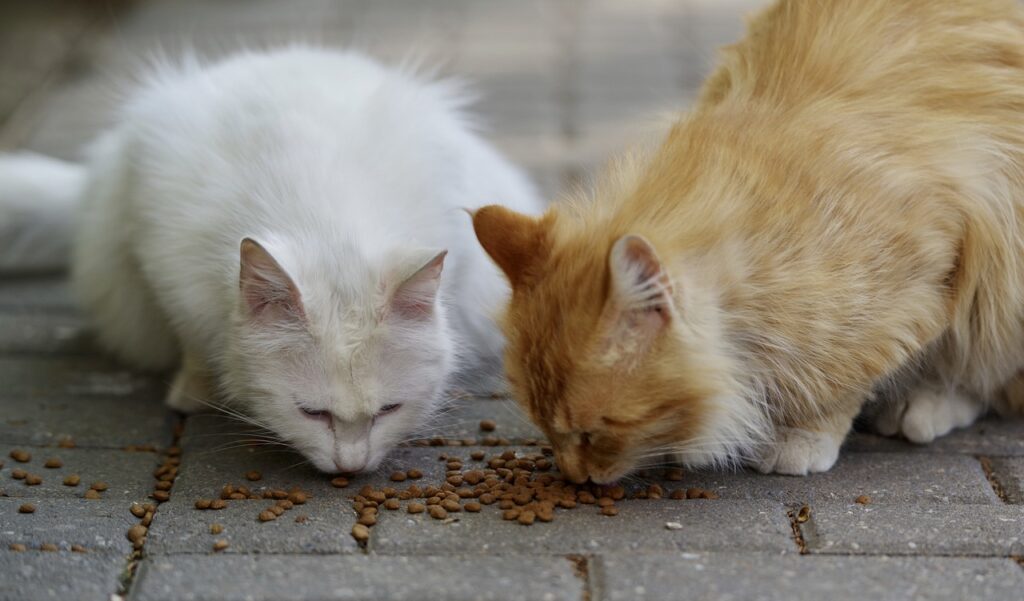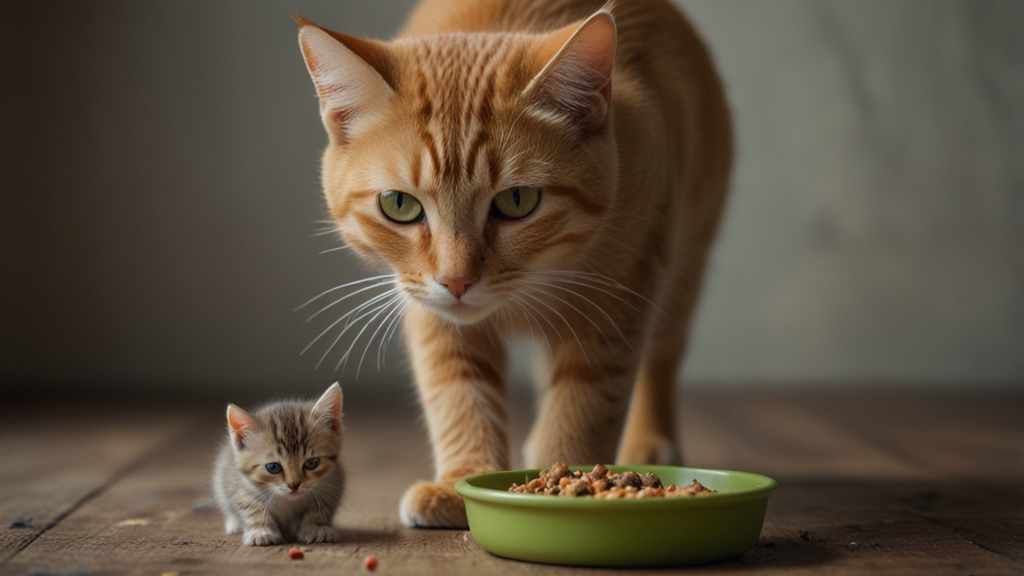Cats are beloved companions, and just like us, they need age-appropriate nutrition to stay healthy and active throughout their lives. Each life stage brings specific nutritional requirements, from high-energy foods for playful kittens to nutrient-rich diets for senior cats. Choosing the right food for each phase of a cat’s life can make a huge difference in their overall health and well-being. Here’s a guide on the best foods for cats of all ages.
1. Kittens (Birth to 12 Months)
Nutritional Needs: Kittens are in a rapid growth phase, requiring a diet packed with high-quality protein, essential fats, and minerals like calcium and phosphorus to support their bones and muscles. Since kittens are highly active, they also need higher calorie intake to fuel their playfulness and development.
Suitable Foods: Foods specifically labeled for kittens are ideal, as these contain the extra nutrients they need to thrive. Look for high-quality kitten formulas that list animal protein (like chicken, turkey, or fish) as the primary ingredient, as animal proteins provide the essential amino acids that cats require. Additionally, kitten foods often include DHA, an omega-3 fatty acid essential for brain and eye development.
What to Avoid: Avoid feeding kittens adult cat food, as it may not meet their higher protein, fat, and caloric needs. It’s also best to steer clear of foods with artificial preservatives, colors, or fillers, as these can be harder for kittens to digest.
Example Brands for Kittens:
- Royal Canin Kitten Food
- Hill’s Science Diet Kitten
- Blue Buffalo Healthy Growth Kitten Formula
2. Young Adult Cats (1 to 7 Years)

Nutritional Needs: Adult cats require balanced nutrition to maintain healthy muscles, a shiny coat, and energy for daily activities. They need moderate amounts of protein and fat, along with essential vitamins and minerals to support immune health and overall wellness. Cats are obligate carnivores, meaning their diet should remain high in animal-based proteins to meet their natural dietary needs.
Suitable Foods: Foods labeled as “adult maintenance” formulas are designed to support adult cats’ nutritional needs. Look for food with quality proteins like chicken, turkey, or fish, and choose a balance of wet and dry food if possible. Wet food provides moisture that can support urinary health, while dry food helps maintain dental health. Additionally, consider your cat’s activity level; highly active cats may need a slightly higher caloric intake.
What to Avoid: Avoid kitten foods, which may provide too many calories and lead to weight gain in adult cats. Also, steer clear of foods high in fillers, by-products, and artificial ingredients, as these can lead to digestive issues or allergies over time.
Example Brands for Adult Cats:
- Purina Pro Plan Adult
- Hill’s Science Diet Adult
- Wellness CORE Grain-Free Adult
3. Senior Cats (7+ Years)
Nutritional Needs: Senior cats may experience changes in metabolism, lower activity levels, and even specific health concerns like joint stiffness, kidney issues, or reduced digestive efficiency. Their diet should include moderate protein levels, lower fat, and sometimes higher fiber to support digestion. Nutrients like omega-3 fatty acids and antioxidants are also beneficial for joint health and immune support.
Suitable Foods: Many cat food brands offer “senior” formulas specifically designed for aging cats. These foods typically have reduced calories to prevent weight gain while still including high-quality proteins to maintain muscle mass. Senior formulas often include extra antioxidants and omega-3 fatty acids for joint health and immune system support. Some senior cats may also benefit from softer wet foods if they have dental issues.
What to Avoid: Avoid foods with excess phosphorus, as high phosphorus can stress the kidneys, which are often sensitive in older cats. Foods too high in fat or calories should also be avoided, as weight gain can exacerbate joint issues and other age-related health concerns.
Example Brands for Senior Cats:
- Hill’s Science Diet Senior
- Nutro Wholesome Essentials Senior
- Blue Buffalo Healthy Aging Senior Cat Food
4. Special Diets for Cats of All Ages

Certain cats may have unique health needs that require specialized diets, no matter their age. Here are some dietary options that can address specific conditions:
- Grain-Free Diets: Suitable for cats with grain allergies or sensitivities. Grain-free options often replace grains with high-fiber vegetables, which can improve digestion for some cats.
- Limited Ingredient Diets: Ideal for cats with food allergies or sensitive stomachs. Limited ingredient foods typically contain a single protein source and fewer ingredients, making it easier to pinpoint and eliminate potential allergens.
- High-Protein Diets: Active or working cats, such as those allowed to roam outdoors, may benefit from a high-protein diet to support their energy levels and maintain muscle mass.
- Urinary Health Formulas: Cats prone to urinary issues, such as crystal formation, may benefit from specialized diets that promote urinary health by balancing pH levels and reducing the likelihood of crystals or stones.
5. Treats and Supplements
While treats are a fun way to reward your cat, they should be given in moderation and chosen carefully. Opt for treats with high-quality ingredients and minimal fillers. For senior cats or those with specific health issues, supplements can be beneficial. Common supplements for cats include:
- Omega-3 fatty acids for coat and joint health
- Probiotics to support digestion
- Glucosamine and chondroitin for joint support in older cats
- Taurine, an essential amino acid for heart health, if not sufficiently present in their main diet
Before introducing supplements, consult your veterinarian to ensure they’re safe and appropriate for your cat’s age and health.
Wet vs. Dry Food: The Balance for All Ages
Many cat owners wonder whether to feed their cats dry food, wet food, or a combination of both. Each type of food offers distinct benefits:
- Wet Food: Wet food provides additional hydration, which is beneficial for all cats, especially those who might not drink enough water. It’s often more palatable and can help support kidney health, urinary tract health, and weight management.
- Dry Food: Dry food can be convenient and cost-effective. It’s also beneficial for dental health, as the crunchiness can help reduce plaque buildup. For adult and senior cats, dry food may be more practical if they don’t have dental issues.
A combination of wet and dry food is generally recommended for all life stages, as it provides a mix of textures and keeps cats interested in their meals.
Conclusion: Choosing the Right Food for Every Life Stage
Choosing the right food for your cat’s age ensures they receive the nutrients they need to thrive through every phase of life. Kittens need high-energy, nutrient-dense foods to support their growth, adults require balanced maintenance diets, and seniors benefit from foods that support joint health, digestion, and kidney function.
By paying attention to their specific dietary requirements, you’ll be helping your cat lead a healthy, happy, and active life. Consult your vet for personalized recommendations, especially if your cat has unique dietary needs or health conditions. With thoughtful nutrition choices, you’ll provide the foundation for a long, healthy life for your feline friend.

